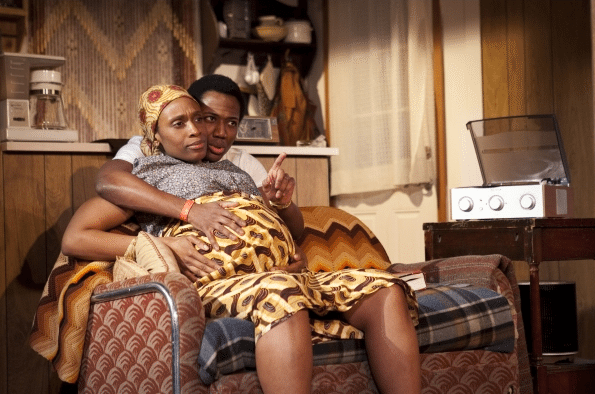

As Sojourners begins, we see a very pregnant Abasiama (Chinasa Ogbuagu) in her house, as she has a conversation with her belly. Wondering what to eat, there’s a sense of restlessness in how she moves from the living room to the kitchen, and how she looks at the door waiting for something or someone to arrive. It makes sense that her attention is so drawn to the door, because if anything Mfoniso Udofia’s play is about portals that close and open unexpectedly, and how we decide on which side we want to be. Abasiama is a Nigerian immigrant living in 1978 Texas with her slacker husband Ukpong (Hubert Point-Du Jour), a man that’s committed to everything except his wife.
When we first meet him, as he interrupts Abasiama’s conversation with her unborn baby, he arrives with great news of a rally he attended, in which “blacks, whites, rich and poor” all shared a life-altering experience. Where Abasiama is worried about how to support her family, Ukpong is more worried with enriching his soul, he’s like the idealistic Pinocchio to Abasiama’s responsible Gepetto. But where Abasiama lacks a sense of wonder, she’s always afraid to try out something new (perhaps because she is worried she will forget her own traditions) Ukpong is all about becoming “an American”, which is why he insists Abasiama must try pickles and listen to records (the radio back home is “an instrument of death” he explains).
At the gas station where she works, Abasiama meets Moxie (Lakisha Michelle May) a foul mouthed sex worker who arrives looking for a job and is taken back by the slightly older woman’s kindness, and Disciple (Chinaza Uche) an intellectual student working on his thesis who is similarly stricken by Abasiama’s subtly powerful personality. If on occasion the character seems as if she will get lost in the symbolism of having her as the ultimate mother figure, Ogbuagu’s exquisite performance instantly humanizes her reminding us that Abasiama is not who she becomes in the eyes of those around her. Kudos to director Ed Sylvanus Iskandar for conveying the striking images in Udofia's script, there is one moment of ravishing beauty in the second act as Moxie pays a visit to Abasiama in a hospital, that will haunt anyone sitting in the audience.
Udofia’s play cleverly touches on the variations of the American dream for everyone who feels like an outcast, whether they were born in the States or not, and wonders if the dream is difficult to achieve because they refuse to give in to societal expectations, because of the pure love for their home country, or even if it’s because it has been decided for them that they simply don’t fit into the mold, as is the case with Moxie. If at times the play allows the characters to be slightly caricaturesque, May grows into Moxie as each scene progresses, taking her from a sassy stereotype to a heartbreaking example of someone putting on the performance the world demands of her, the journey it takes us on is absolutely necessary.